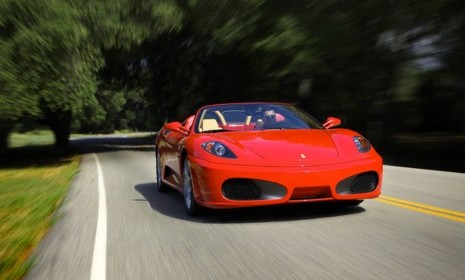The $290,000 speeding ticket
Thanks to European road rules that target the rich, a Swiss multi-millionaire was fined a fortune. Are the new laws unfair?

A free daily email with the biggest news stories of the day – and the best features from TheWeek.com
You are now subscribed
Your newsletter sign-up was successful
As thrillingly reckless as it might seem to drive a Ferrari Testarossa at 85 mph in a 50 mph zone, don't try it in Switzerland — unless you're willing to cough up $290,000. Like law authorities in an increasingly number of European countries, Swiss courts take the speeding driver's income into account when tallying the fine. The Ferrari driver in question, a repeat offender, was worth $20 million; hence, the massive penalty. Good idea or completely discriminatory?
Good for you, Switzerland: This should be applauded, says Ann Althouse on her blog. A fine will never be an effective deterrent "unless you take the individual into account." A speeding millionaire shouldn't be able to "casually buy his way into having the rules not apply to him" if the fine is something that may "burden lesser folk" but is "nothing to him."
"How do you figure a $290,000 fine for speeding?"
The Week
Escape your echo chamber. Get the facts behind the news, plus analysis from multiple perspectives.

Sign up for The Week's Free Newsletters
From our morning news briefing to a weekly Good News Newsletter, get the best of The Week delivered directly to your inbox.
From our morning news briefing to a weekly Good News Newsletter, get the best of The Week delivered directly to your inbox.
This intriguingly ruthless strategy is environmentally sound: This isn't about "Commies soaking the rich," says Lloyd Alter at Treehugger, but about slowing people down. And that's a really good idea in terms of saving lives, saving fuel, and letting drivers of small cars feel "more comfortable on the road."
"A Fine Idea: $290,000 Speeding Ticket Is Proportional To Income. Do You Agree?"
But it won't work: The only question here is whether levying income-linked fines "actually does anything to deter law-breaking by the very rich," says Catherine Rampell in The New York Times. Unfortunately, my "gut reaction" says no. Despite what "traditional economics" might have you believe, people don't engage in "cost-benefit analysis" when deciding whether or not to "commit crimes."
"Should the Fine You Pay Be Based on How Rich You Are?"
A free daily email with the biggest news stories of the day – and the best features from TheWeek.com
-
 Political cartoons for February 16
Political cartoons for February 16Cartoons Monday’s political cartoons include President's Day, a valentine from the Epstein files, and more
-
 Regent Hong Kong: a tranquil haven with a prime waterfront spot
Regent Hong Kong: a tranquil haven with a prime waterfront spotThe Week Recommends The trendy hotel recently underwent an extensive two-year revamp
-
 The problem with diagnosing profound autism
The problem with diagnosing profound autismThe Explainer Experts are reconsidering the idea of autism as a spectrum, which could impact diagnoses and policy making for the condition